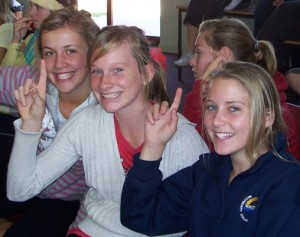Practices. Practices!
- On 19-02-2010
I have had an interesting time this week as I went and visited a range of schools to observe teachers teaching (or should that be … provide a space for learning to occur?). I was able to sit in on a range of teachers and the variety of approaches they use to promote learning.
Before I get into the topic of teacher practices I think I must start by saying that good inquiry learning requires elements of explicit teaching, practicing, skill development, and inquiry. It is a mistake to think that you do not have explicit teaching or rote learning as part of the process. Why? Well … if you examine how the brain builds knowledge .. repetition is critical (look at anyone trying to learn a new sport). Explicit teaching is critical … you cannot develop critical thinking skills without having a knowledge base.
So let’s discuss practices …
The context where inquiry learning works best is one where the students (and teachers) are developing certain capacities and skills whilst learning about something. In a content focussed curriculum there is no focus on skills apart from that which has content understood.
They are two different paradigms and lead to two different outcomes.
In the paradigm of developing skills and capacities in our students … everything you or the students do is an opportunity to develop the skills and capacities. Let me give you some examples.
Example A
Two teachers were team teaching and while one led an inquiry into a particular topic the other teacher listened in and occasionally added reinforcement to what was said or added to the inquiry to help the students. It was excellent as I watched to see how the two teachers interacted with each other and with the students. The inquiry was engaging and had the students thinking and interacting. It was led purely by asking questions and the students responding. There was even one point where the teacher had one of the students come to the front and share about a practice they had in the class (around literacy) for the other students. One practice I suggested afterwards … to support the learning of the students and to develop a capacity … was for the second teacher to write notes on the whiteboard of the inquiry as the inquiry runs. That way the students see a role model on how to take notes. If the teachers practiced this all the time and then later in the term / semester had the students taking notes as the teacher modelled it .. then they learn note taking skills much quicker (and improve literacy).
Example B
A teacher was running a game (called 10 seconds I beleive) where a person had to walk across the room and do it in exactly 10 seconds but without any watches apart from the timer the teacher held. The students then had to guest what time it was done in and the aim was for the walkers to get as close as possible to 10 seconds. This game was a great maths exercise as the students needed to work out “closeness” as well as strategies for thinking about marking time, etc. The teacher used her interactive whiteboard to put the numbers in a grid and had each student fill in their own grid before she filled in the group grid. It was a very rich exercise and I was really pleased about the range of practices and scafolding she had in the session. The one practice I suggested (again to continue to developing particular skills in the students) was to get up a second window on the Interactive Whiteboard and automatically graph the tries so the visually oriented students can see how it their tries are getting closer to the magical 10 second mark.
There are lots of examples of practices that teachers can invent standing in .. “what capacity will I build in my students now?”. Rather than leaving the training of internet research skills just to the ICT lesson … what about doing it in class interactively with the interactive whiteboard and show them your thinking as you search for information (use google, wikipedia, and a range of resources). Discuss about how some information is useful and not (have them say) as you look at things online. Have them give you the keywords to look up and inquire about whether they give good results or not.
A great inquiry learning unit will have lots of embedded practices that teachers have consciously placed in their to develop particular skills.
What are your practices … share your ideas in the comments section!
For those of you interested … two great links with great ideas.
1. http://www.aalf.org/ : A website about one-to-one learning and the teaching practices you can use to scaffold learning as we enter a more one to one environment with technology
2. http://www.sharpbrains.com/: An excellent resource about neuroscience and the brain. It is a general website but some of the articles are extraordinary (e.g. Is Working Memory a better predictor of academic success than IQ?: Dr. Tracy Alloway summarizes a recent landmark study, published in the Journal of Experimental Child Psychology, which tracked children over a six-year period. Key finding: Working memory can be a more powerful predictor of academic success than IQ scores)

0 Comments